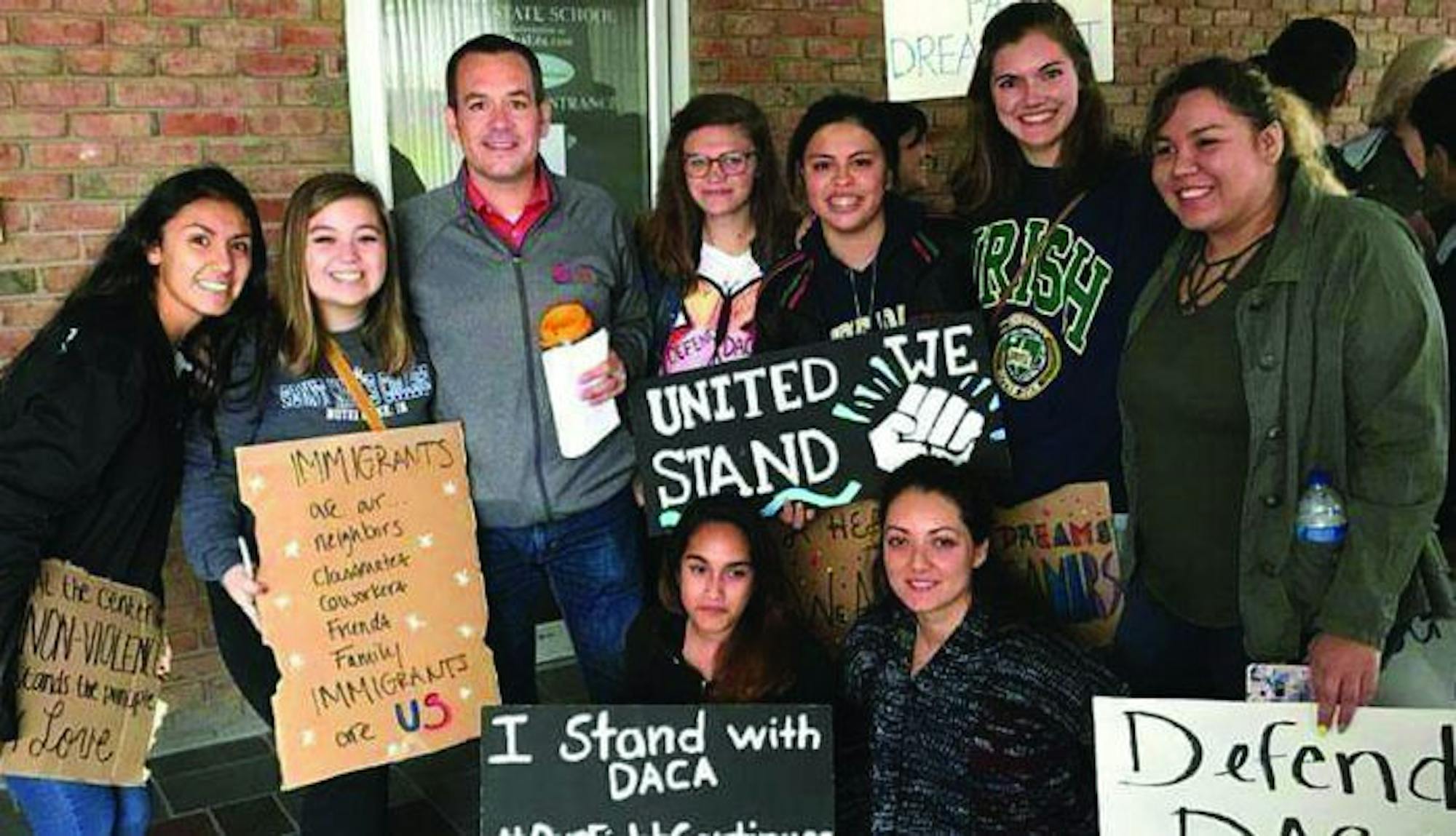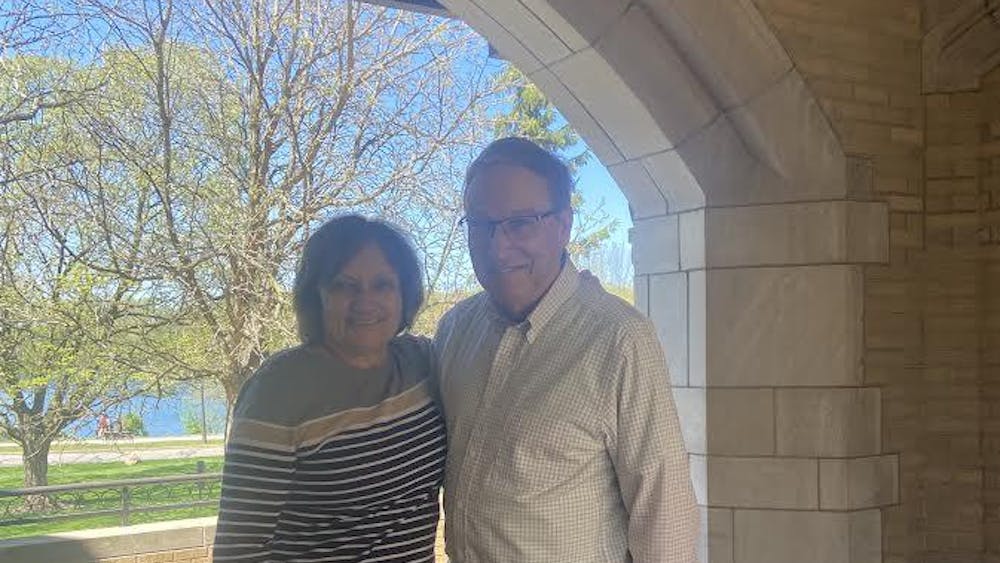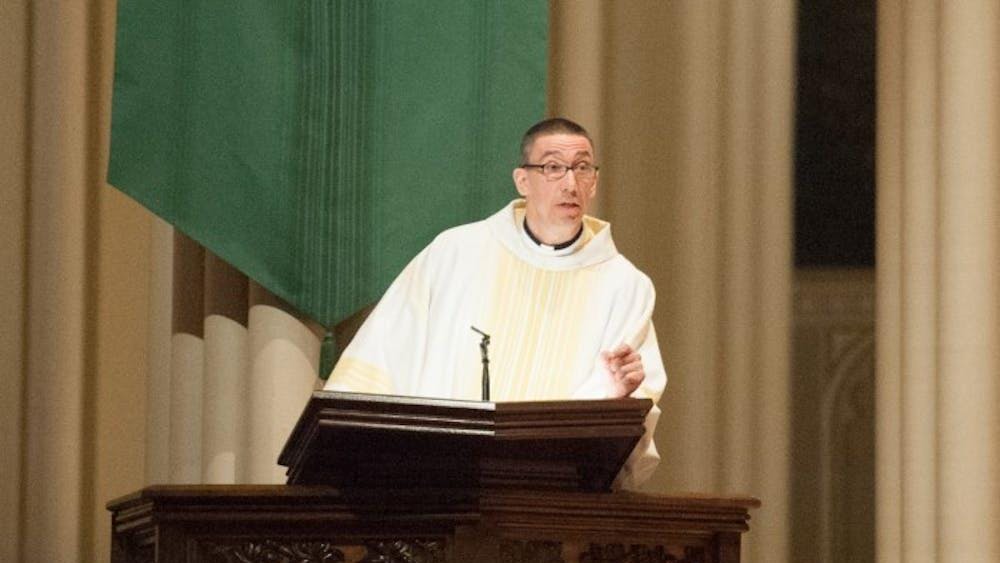Editor’s note: This is the second story in a three-part series addressing various political issues and their impact at Notre Dame one year after the 2016 election. Today’s story focuses on immigration and student perspectives on the DACA repeal.
Less than a week after the 2016 election, University President Fr. John Jenkins held an interfaith prayer service during which he promised undocumented students at Notre Dame that they have the full support of the University.
“You accepted our invitation to come to Notre Dame,” he said at the prayer service held Nov. 14, 2016. “You are part of our family. We will do everything we can to ensure that you complete your education, and you are supported in every way possible.”
Two days later, on Nov. 16, College President Jan Cervelli took a sign demonstrating her support for undocumented students — as well as support for Saint Mary’s becoming a sanctuary campus — from a group of students handing them out in Le Mans Hall.
One year later, the University and College administrations have continued to support undocumented students, but the stakes are higher. On Sept. 5, the Trump administration announced plans to end the Deferred Action for Childhood Arrivals (DACA) program, which allows children of undocumented migrants in the United States to work and study. Trump gave the House and Senate a six-month deadline to pass legislation to replace DACA, but over two months later there is no plan in place to do so.
Notre Dame junior Gargi Purohit, a beneficiary of DACA and president of the Student Coalition for Immigration Advocacy, said while she appreciates the support she has received from the University community, she wants to see more action from the administration in terms of protecting undocumented students at Notre Dame.
“I think the University, while they have showed that they’ve cared for us, I think that they need to start making plans for us before something bad happens,” Purohit said. “So we met with the Notre Dame administration right after the news of DACA — like the day after — and they told us their plans, which was just so frustrating because we asked them in a meeting the entire year before after Trump got elected, ‘What’s your plan?’ and they finally got back to us.”
Given the administration’s timing thus far, Purohit said she is concerned that any protection for DACA students will be put in place too late.
“I really want them to move at a faster pace and not divulge what their plan is after DACA [gets] taken away,” she said. “And, God forbid, after … one of our parents or one of us gets detained, that’s when they really start taking action. So they’re capable of doing so much more, and I think they need to go a lot faster than the pace going on right now, and not wait until the last minute after something bad happens.”
Protests and petitions among students have also become less prevalent in the year since Trump’s election and his announcement about DACA. Saint Mary’s junior Teresa Brickey, who hopes to pursue a career in immigration law, said students are instead turning to other movements to seek actual influence on policy.
“[Last year], I was a part of that, going out and protesting, getting people together,” she said. “This year, I haven’t seen it so much. I’m at the point where I don’t want to act upon initial feelings anymore. I want to do something only if it’s fruitful. It’s still important to protest — I’m definitely not disregarding that — but I don’t want to just put words on cardboard and go out and stand. Rather, we should be calling senators and being active participants in our democracy.”
While most of the public response to DACA being rescinded has taken the form of support for those affected by the decision at Notre Dame and Saint Mary’s, there are students who take a more conservative stance on DACA and other issues of immigration.
Notre Dame junior Jeffrey Murphy, treasurer of the College Republicans, said he wishes Trump hadn’t given legislators a six-month timeframe in which to replace DACA.
“I think he should’ve ended it overnight, and if Congress wants to act, Congress can act,” Murphy said.
While Murphy said he is comfortable expressing his views on DACA, Saint Mary’s senior Christina Herrera, who approves of DACA’s repeal, said the College’s campus is less open to conservative opinions.
“I felt like I was being targeted in class when I would speak out against DACA just because it doesn’t really help anyone,” she said. “The point of it is to have them stay here, and we need permanent legislation, not something temporary again that you’re going to have to renew in another six months or 12 months. I think a lot of people who are very pro-DACA or are here for DACA don’t want to hear that, because they just automatically think you’re against them.”
Purohit said she has trouble hearing out people who are against DACA because she believes they are often misinformed.
“At this point, I’m really debating on whether I need to listen to the other side because often times I hear the other side, and it’s all just misconceptions,” she said. “There aren’t a lot of facts. It’s all really prominently based on myths and on hate, so I really wish, given this current climate on politics and given how much damage Trump has done to so many areas, I wish people would really take their time and learn about how the politics are really affecting students.”
While Murphy said DACA recipients are the only group of undocumented immigrants he feels “could receive special consideration,” he still wants to see Trump and Congress put “America first” on this issue.
“On my list of wins and losses, DACA falls under a loss at the moment because we had the 15 minutes where Attorney General [Jeff] Sessions announced DACA was going to be rescinded, and I thought, brilliant,” he said. “ … [Trump] made very strong remarks that he was going to rescind DACA, but then he said things like DACA recipients shouldn’t worry and that Dreamers should — I think his quote was ‘rest easy.’ So then I’m thinking is he or isn’t he going to do what he promised, which was put American interests first.”
Brickey, however, believes allowing the country to benefit from the contributions of undocumented immigrants is putting America first.
“Undocumented students, professors and community members are still just as important to this community at Saint Mary’s, Notre Dame, Holy Cross, South Bend, our country on a broader scale, as I am or citizens are,” Brickey said. “They’re contributing in ways that we may not see or know because we don’t see their work every day. … Their contributions are just as important as my own.”
Herrera said this is an emotional view to take and that she thinks immigrants can achieve citizenship through proper channels.
“I’m Hispanic, and I have friends that are affected by DACA … and there are immigrants in my family, so I understand why it’s so emotional,” she said. “I could never imagine having my parents there one day, and then they’re gone the next, so I totally understand that. … I’m against [undocumented] immigration just because there are people who have worked so hard to get here legally.”
An additional argument that Murphy said is less reasonable than it initially seems to be is that children should not be punished for their parents’ crimes.
“There are plenty of children that suffer because their parents commit crimes,” Murphy said. “Like the Enron executives — their children are paying the price for their parents committing crimes. Bernie Madoff’s kid killed himself because the repercussions of his father’s illegal activity were so harsh. So when your parent commits a crime, there are going to be repercussions and children are going to have to pay the price. That’s true for American criminals and that’s true for illegal alien criminals.”
Purohit said she has resigned herself to the idea that Notre Dame’s campus — and beyond — will remain split on the issues of immigration and DACA.
“I think there are just always going to be people on the other side that will always just stay there,” she said. “And I don’t think that they’ll ever really try to understand the other side and really try to listen to these stories and do their own research and hear the facts, and I think it’s just always going to be filled with hate. And to be quite frank, I don’t really care about the other side or whatever decisions they personally choose to make.”
Herrera said other students’ perception of her opinion — which may oppose the beliefs of many others on campus — does not affect her.
“It’s not going to matter at the end of the day if this girl doesn’t like me because of my stance on immigration,” she said.












